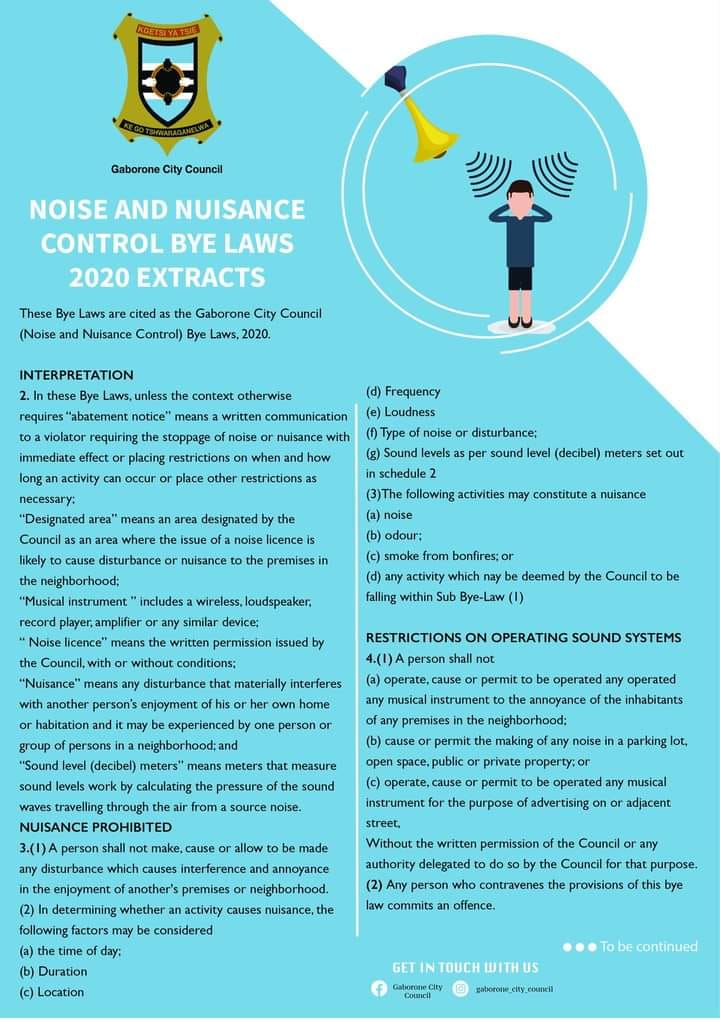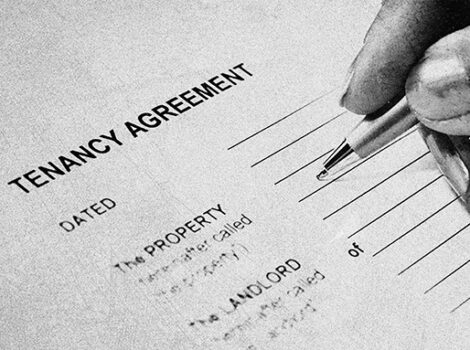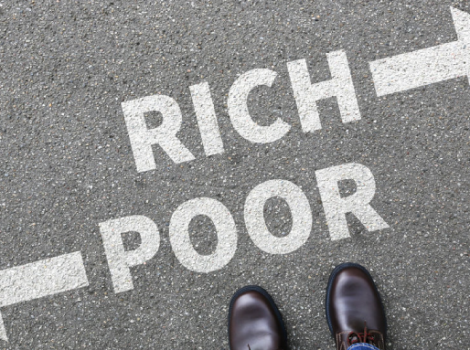In Botswana, like everywhere else in the world, Friday marks the end of a long and tiring week. While some of us like to relax with friends/family or put our feet up in front of the TV, others like to party and party hard. Unfortunately, many of these parties are shared with everyone, whether we like it or not. The music coming from bars or private parties can be unbelievably loud. The volume can be unbearable, which is highly inconsiderate, and this level of disturbance is commonly known as noise pollution.
Noise pollution is defined as unwanted or disturbing sound in the environment, that affects the health and well-being of humans and other living organisms.
It doesn’t matter what time of the day it is or what day of the week it is, there is no justification for music that is so loud I have to increase the volume on my TV. Parties get worse over holiday weekends, but they are only half the problem. ‘Churches’ can contribute to disturbing the peace, and some have introduced all-night sessions. I live just outside Gaborone city in a housing complex, which is home to a number of families with young children. Next door to the complex is an industrial estate, and within the complex, there are houses being built. My wife and I work from home, and on a daily basis, we are subjected to some level of noise. Maids and gardeners shouting to each other, workmen banging hammers and drilling, trucks and diggers coming and going as well as children playing and screaming for hours on end. I look forward to dusk, when all I can hear is the sound of birds settling down for the night.
Over the years, there have been noise issues within the complex. People inviting their friends for social gatherings, and that sound of birds would quickly become the sound of music… and I don’t mean Julie Andrews performing live. Thankfully, one of the few and very unexpected positives of the COVID pandemic was social distancing. The communal area was off limits, and so the parties disappeared. However, the lifting of COVID protocols has seen the return of parties outside the complex and church gatherings. I was brought up Catholic, and if you stand outside a Catholic church, you wouldn’t really hear what was happening inside. The priest speaks through a microphone and yet he can’t be heard outside of the building, Catholic churches generally don’t disturb the peace or irritate those living nearby.
These bizarre fire churches are entirely different. Mimicking their masters from America, the pastors scream down a microphone and live bands play never-ending songs. This can be your wake-up call on a Sunday morning, but some have started to conduct all-night masses. Religion is a private matter, and I’m fairly sure Jesus told his followers to go IN PEACE to love and serve the lord. He did not say go and ram Christianity down the throats of everyone within earshot.
Many will say Botswana is a Christian country, but the Christian faith teaches us to be kind and considerate and love thy neighbour. Christians and Catholics alike are taught to be tolerant of others and their beliefs. Botswana is home to a number of different cultures and religions – Islam, Hindu, etc. If a mosque was guilty of the same antisocial practises as a fire church, people would be up in arms and offended. So why are fire churches exempt? Being Christian doesn’t give you the right to be a nuisance. If you want your beliefs to be respected, show some respect to those around you who either have different beliefs or choose to practise their beliefs in a different way.
I am conscious of the impacts of loud music on my health, but I’m also concerned of the impacts on the beautiful wildlife that surrounds us. A very quick Google search brought up some surprising findings with regards to noise pollution. The culprits risk hearing problems, but the victims that are tortured by the noise are at risk of sleep deprivation, stress and high blood pressure. High blood pressure is a common problem in Botswana – having read this article so far, are you surprised?
If you are still reading this article, you may be interested and surprised to read the National Geographic extract below. I already knew loud noise had a negative impact on wildlife, but I wasn’t aware to what extent the damage noise causes.
Noise pollution impacts millions of people on a daily basis. The most common health problem it causes is Noise Induced Hearing Loss (NIHL). Exposure to loud noise can also cause high blood pressure, heart disease, sleep disturbances and stress. These health problems can affect all age groups, especially children. Many children who live near noisy airports or streets have been found to suffer from stress and other problems, such as impairments in memory, attention level, and reading skills.
Noise pollution also impacts the health and well-being of wildlife. Studies have shown that loud noises can cause caterpillars’ dorsal vessels (the insect equivalent of a heart) to beat faster, and cause bluebirds to have fewer chicks. Animals use sound for a variety of reasons, including to navigate, find food, attract mates and avoid predators. Noise pollution makes it difficult for them to accomplish these tasks, which affects their ability to survive.
https://education.nationalgeographic.org/resource/noise-pollution
Most people reading this won’t see what the problem is. But what these people forget is their neighbours can be babies or young children trying to sleep, elderly people and workers who work shifts or unsociable hours (nurses, doctors, emergency services, journalists, etc). We don’t begrudge these guys having parties, but does everyone within a 10km radius need to hear your music?
Taste in music is subjective, but the pain and inconvenience it causes when played extremely loud isn’t. Loud noise or music is used as a form of torture, which is recognised internationally. There is a term known as music torture, a method that has been used on prisoners or people who are besieged. The United Nations and the European Court of Human Rights have banned ‘music torture’ as a method used in interrogations. Even interrogation experts in the United States have acknowledged it causes severe discomfort. The long-term damage will continue to be debated, but ask anyone who lives next door to a noisy neighbour and watch their expressions rapidly change. Your loud music is torturous.
Our new year was ruined by excessively loud music. Mentioning no names, we booked into a well-known lodge in Maun and staying in the opposite chalet to ours was a local celebrity. The warning signs were there, as he and his friends would start setting up the bar and the braai stands around noon. This person was there for 3 or 4 days and every day was the same, music on high right through to around 03:00AM. I’m talking about volume that makes your door vibrate. We had a game drive booked on one day, and we had to get up at around 04:00AM. We complained to the hotel, who asked the music be turned down, but they just turned it back up after a few minutes.

People have said if you complain to the police, they will investigate and should they find the source of the noise, they will shut it down. That’s great. But surely the police shouldn’t be waiting for complaints. The wildlife can’t complain. Enough is enough. It’s time for the government and local councils to adopt a zero tolerance on noise pollution. It’s time for those law-abiding residents who peacefully go about their lives to be considered above the rude and inconsiderate. They may not be committing crimes in the traditional sense, but excessive noise is a public nuisance, and it’s damaging to wildlife. To a country like Botswana, the fact excessively loud music is detrimental to wildlife should make noise pollution unacceptable.
We are not talking about unavoidable or complex scenarios such as flight paths or construction causing too much noise. We are talking about people who choose to turn up the volume, and yet they can still enjoy their music if they choose to turn the volume down.
YourBotswana Writer





My thoughts resonate with this. Let’s say louder please!